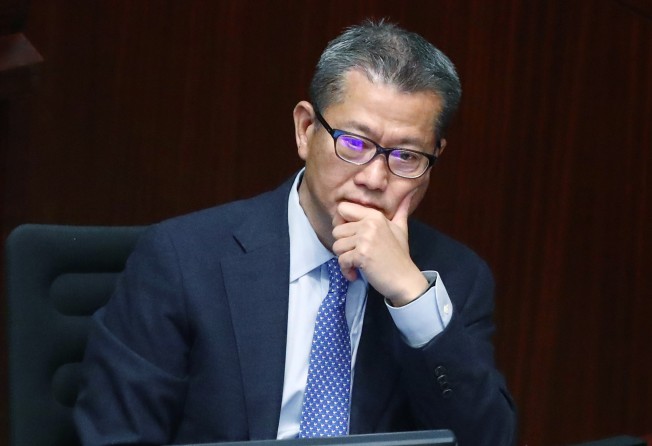
Cash handouts for Hongkongers unlikely, finance chief says ahead of annual budget announcement
City favours ‘more targeted measures’ than the support issued by Macau government, which said residents would each receive HK$8,700 this year

Hongkongers hoping to receive cash handouts from the government this year may be disappointed, as the city’s finance chief expressed reservations about using the huge surplus to dish out sweeteners.
Financial Secretary Paul Chan Mo-po, who is due to deliver his annual budget on February 28, said the government preferred more targeted relief measures.
“The government does not entirely agree with ways that do not target any specific group, like what has been done in Macau. There are a lot of people in the community who also disagree with such methods, so the government would tend to prefer more targeted measures,” Chan said on a Commercial Radio programme on Saturday.
The Macau government has been giving out one-off cash handouts to its residents for 11 years in a row since 2008. The city’s chief executive Fernando Chui Sai-on announced in November that each permanent resident would receive 9,000 patacas (HK$8,700/US$1,100) this year.
In Hong Kong, former finance chief John Tsang Chun-wah dished out a one-time cash sweetener of HK$6,000 for each resident in the 2011-12 financial year.
This comes as Hong Kong is set to reap a massive surplus of close to HK$160 billion this year, much larger than the original estimate of HK$16.3 billion for 2017-18, according to figures earlier obtained by the Post.

Hong Kong’s budget surplus has been underestimated for almost 10 years in a row, largely due to a windfall in land sales and stamp duty revenues from a booming property market.
As of November last year, the city had a cumulative surplus for the year of HK$57.2 billion, four times the original estimate of HK$16.3 billion for the whole of 2017-18.
The city’s fiscal reserves ballooned to HK$1.7 trillion by December 31 last year.
Chan has revealed that the city will see a “considerably high” surplus this year, but said that it did not amount to market predictions.
A number of big accounting firms earlier projected that the surplus was likely to be between HK$160 billion and HK$180 billion by the end of March 2018.
Chan said that the surplus would be invested in striking a balance between Hong Kong’s long term development and short term rebates and relief measures, with priority given to elderly care, medical services, research and creative industries.
In response to questions of whether the government would hand out cash, Chief Executive Carrie Lam Cheng Yuet-ngor said on another radio programme on Saturday that the government needed “prudent financial management”, and that cash handouts had only been done once before.
Despite the expected surplus, Chan stressed that there would not be any sweeping cuts for profit taxes.
“[I would] rather consider targeted tax measures, to help, say for example, a particular industry or to induce a particular behaviour which may benefit the society or to create jobs. For these kind of proposals, I would give it serious consideration, but across the board tax cuts, sorry I’m not going to do that.

For salaries tax, Chan said the current standard tax rate of 15 per cent was competitive compared to other places around the world, and that “casually adjusting the tax rate would send a confusing message” to the market and was not encouraged.
At present, salaries tax is calculated at a progressive rate on a net chargeable income, or at a standard rate on a net income, whichever is lower.
The standard tax rate’s calculation method is often used for earners in the higher income bracket.
For example, singles who earn an annual income of at least HK$1.8 million are likely to be taxed at the standard rate, rather than the progressive rate.
Dr Chung Kim-wah, a political scientist at Polytechnic University, said Chan’s comments were part of an “expectation management strategy” ahead of the budget address.
“He is trying to manage the people’s expectations, but whether there will be any surprises is another matter,” Chung said.
Chung said even though Chan has hinted there would not be any tax breaks, he said it was likely that there would be room to widen the marginal bands for salaries tax.
Last year, the tax band was widened from HK$40,000 to HK$45,000, benefiting 1.3 million taxpayers a year. At present, the first HK$45,000 of net chargeable income is taxed at 2 per cent and the next HK$45,000 taxed 7 per cent. The additional HK$45,000 is taxed at 12 per cent and the remainder taxed at 17 per cent.
Chung said widening the tax band could lighten the burden of middle-income taxpayers.